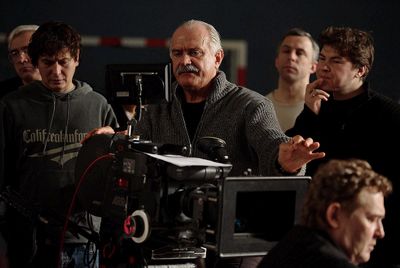Review: ‘12’ absorbing but runs too long

A dozen Russians gather in a high school gym to consider the fate of a young Chechen man accused of murdering his Russian stepfather.
They don’t know each other’s names, nor do we. But we recognize the “types.” There’s the surgeon, the builder, the actor, the cemetery manager, the TV writer, the artist and the cab driver.
We soon learn their prejudices, especially when it comes to Chechen “terrorists.” They’re a dozen angry men, and the angriest of all is that cabby.
Nikita Mikhalkov’s “12” is a Russian take on the classic Sidney Lumet courtroom drama “12 Angry Men.” Swap the simmering heat of that 1957 film with the snowy Russian winter, change the object of prejudice to Chechen and the language of the arguments to Russian (with English subtitles) and it’s the same movie, updated and retro-fitted for a nation that hasn’t quite got the hang of democracy and its “equal justice under the law.”
Using long monologues – some of them flashbacks – Mikhalkov (an Oscar winner for “Burnt by the Sun”) shows his all-male jury debate day and night over the fate of a man we also meet in those flashbacks and in his cell, dancing to remember his past and to stop thinking about his fate, hanging in the balance.
“Beyond a reasonable doubt,” one juror mutters, repeating a phrase he’s heard in Hollywood movies.
Every so often, they vote. One deems it unseemly to condemn the kid to life in prison in just a couple of minutes. Another is persuaded, and so on, back and forth.
Mikhalkov (who also plays a juror) has staged a grand piece of theater in a grandly theatrical setting – a gym where the Russian snows occasionally blow in, the lights go on and off and a bird flies in as a tiny metaphor.
The angry men argue and tell pieces of their personal history, which relate to the case they’re deliberating over. They sit and stand, rage and persuade, threaten and cajole, within a room that’s not so large that the claustrophobia of the original “12 Angry Men” is lost.
If there’s a fault with this Oscar nominee for best foreign-language film, it is its own excessive length, leaving room not only for theatrics and the chance for each actor to have the spotlight, but for repetition and tedium. Subtitled films built on long memory monologues are a chore for anybody who doesn’t speak the native language of the actors.
But it’s still fascinating, a stylish movie commentary on Russian justice and the universality of prejudice, and a testimony to Lumet’s long-ago discovery of that perfect crucible for examining human behavior – the jury room.